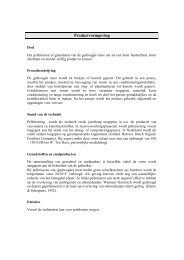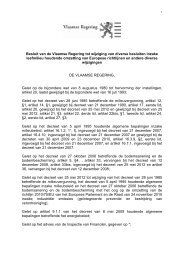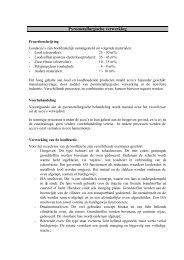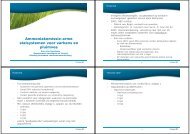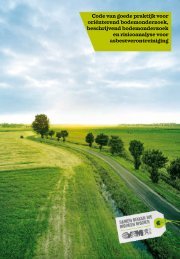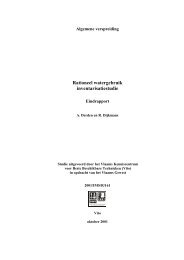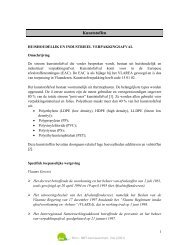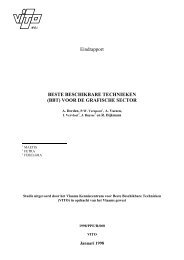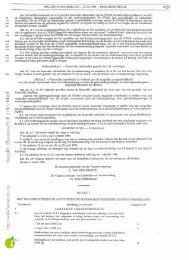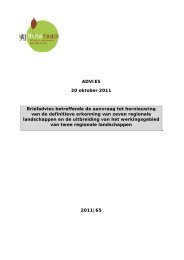- Page 1: Eindrapport (Contractnummer: 981419
- Page 4 and 5: 5.7 BBT-vergunningsnormen met betre
- Page 6 and 7: BBT/EMIS wordt gestuurd door de Vla
- Page 10 and 11: HOOFDSTUK 2: SECTORSTUDIE 2.1 Afbak
- Page 12 and 13: a Groenten- en fruit De productie v
- Page 14 and 15: 2.2 Socio-economische kenmerken van
- Page 16 and 17: 2.2.2 Tewerkstelling Onderstaande f
- Page 18 and 19: 2.3 Producenten van diepvriesgroent
- Page 20 and 21: In onderstaande tabel worden een aa
- Page 22 and 23: In eerste instantie wordt voor dat
- Page 24 and 25: 2.4.2 Bronnen van concurrentie a In
- Page 26 and 27: en de krimpende vraag voor heel wat
- Page 28 and 29: 2.6 Aardappelschillers Ondanks de p
- Page 30 and 31: een sector waar de concurrentiële
- Page 32 and 33: 2.8 Algemene conclusie van de socio
- Page 34 and 35: • Ter illustratie - in de zomer o
- Page 36 and 37: - pasteuriseren; enz. Daarnaast wor
- Page 38 and 39: HOOFDSTUK 3: PROCESBESCHRIJVINGEN,
- Page 40 and 41: aanvoer voorreiniging sorteren wass
- Page 42 and 43: aanvoer voorreiniging sorteren wass
- Page 44 and 45: Aanvoer vers fruit Storten in bunke
- Page 46 and 47: 3.1 Aanvoeren, lossen, opslaan en b
- Page 48 and 49: 3.2 Voorbewerking 3.2.1 Procesbesch
- Page 50 and 51: 3.2.1.3 Voorbereidingsstappen bij g
- Page 52 and 53: In Vlaanderen wordt voor het malen
- Page 54 and 55: Er bestaan verschillende technologi
- Page 56 and 57: • ter beperking van de belasting
- Page 58 and 59:
3.4.1.3 Tussenbereidingsstappen: ge
- Page 60 and 61:
• toevoegen van conserveringsmidd
- Page 62 and 63:
3.5.3 Milieuvriendelijke technieken
- Page 64 and 65:
Voor de dagelijkse reiniging / desi
- Page 66 and 67:
3.8.3 Milieuvriendelijke processen
- Page 68 and 69:
3.10 Afvalwaterzuivering en slibver
- Page 70 and 71:
Figuur 3.8: Voorbeeld 1 van een afv
- Page 72 and 73:
Figuur 3.12: Voorbeeld 5 van een af
- Page 74 and 75:
Figuur 3.15: Voorbeeld 8 van een af
- Page 76 and 77:
Slibverwerking 111 Het verwerken va
- Page 78 and 79:
- dimensioneren van de aërobe zuiv
- Page 80 and 81:
dus regelmatig gecontroleerd te wor
- Page 82 and 83:
HOOFDSTUK 4: BBT-EVALUATIE In dit h
- Page 84 and 85:
Tabel 4.1: Evaluatie van de kandida
- Page 86 and 87:
kandidaat BBT 14. Plaatsen van gelu
- Page 88 and 89:
kandidaat BBT 23. Dagelijks ledigen
- Page 90 and 91:
33. Koel houden snijwater (< 10°C)
- Page 92 and 93:
Tussenbehandelingen kandidaat BBT 4
- Page 94 and 95:
Conserveren kandidaat BBT 48. Produ
- Page 96 and 97:
Reinigen / ontsmetten van productie
- Page 98 and 99:
Koelen en conditioneren van ruimten
- Page 100 and 101:
kandidaat BBT 82. Verwijderen van b
- Page 102 and 103:
kandidaat BBT 92. Secundair slib en
- Page 104 and 105:
102. Afvalwater zuiveren door toepa
- Page 106 and 107:
113. Slib chemisch stabiliseren d.m
- Page 108 and 109:
129. Gebruik van regenwater of vijv
- Page 110 and 111:
HOOFDSTUK 5: VERTALING VAN BBT NAAR
- Page 112 and 113:
Tabel 5.1: Oplijsting van BBT en ve
- Page 114 and 115:
kandidaat BBT BBT Onderbouwing van
- Page 116 and 117:
kandidaat BBT BBT Onderbouwing van
- Page 118 and 119:
kandidaat BBT BBT Onderbouwing van
- Page 120 and 121:
kandidaat BBT BBT Onderbouwing van
- Page 122 and 123:
kandidaat BBT BBT Onderbouwing van
- Page 124 and 125:
5.2 Relatie tussen BBT en afvalwate
- Page 126 and 127:
Opmerking: Bij het verwerken van be
- Page 128 and 129:
en een gemiddeld afvalwaterdebiet v
- Page 130 and 131:
In de tabellen 5.1, 5.2 en 5.3 staa
- Page 132 and 133:
Tabel 5.2: zuiveringsscenario voor
- Page 134 and 135:
De hoger vermelde cijfers zijn uite
- Page 136 and 137:
Tabel 5.4: globale kostprijs van af
- Page 138 and 139:
5.3 Relatie tussen BBT en de behand
- Page 140 and 141:
• Tekort aan grondwater: De voorg
- Page 142 and 143:
142 - water uit sterilisatieprocess
- Page 144 and 145:
Tabel 5.6: gemiddelde behoefte aan
- Page 146 and 147:
HOOFDSTUK 6: VERTALING VAN BBT NAAR
- Page 148 and 149:
Persistente pesticiden 299 148 Het
- Page 150 and 151:
Blancheren • Bandblancheur/waterk
- Page 152 and 153:
g Koelen en conditioneren van ruimt
- Page 154 and 155:
• Hergebruik van al dan niet verr
- Page 156 and 157:
Voor elk van de scenario’s wordt
- Page 158 and 159:
- De bijkomende jaarlijkse kost van
- Page 160 and 161:
Conclusie: - Als referentiesituatie
- Page 162 and 163:
Verwacht wordt dat de situatie van
- Page 164 and 165:
- de referentiesituaties: zuivering
- Page 166 and 167:
BIBLIOGRAFIE An., Afval- en emissie
- Page 168:
DEES, M., Prisma Techniek in woord
- Page 171 and 172:
BIJLAGE 1: DE LEDEN VAN HET BEGELEI
- Page 173 and 174:
Bovenstaande personen vertegenwoord
- Page 175 and 176:
Bezochte bedrijven tijdens het uitv
- Page 177 and 178:
BIJLAGE 3: WET- EN REGELGEVING IN V
- Page 179 and 180:
Art. 5.3.2.1. §1. De in §2 vermel
- Page 181 and 182:
§5. In de milieuvergunning kunnen
- Page 183 and 184:
Art. 5.45.1.4. §1. De lokalen, beh
- Page 185 and 186:
ijlage 5.3.2.17 Vlarem II: groentec
- Page 187 and 188:
. Nuttige toepassing Indien men de
- Page 189 and 190:
- voor het jaar 1997: recyclage: 40
- Page 191 and 192:
7. Warenwetgeving Besluit van de Vl
- Page 193 and 194:
BIJLAGE 4: LOZINGSNORMEN BUITEN VLA
- Page 195 and 196:
BIJLAGE 5: EVALUATIE VAN DE EFFICI
- Page 197 and 198:
Sectorale normen - Riool - 600 1500
- Page 199 and 200:
Bespreking van tabel b.2 (primaire
- Page 201 and 202:
Sectorale normen oppervlaktewater -
- Page 203 and 204:
Resultaat tertiaire zuivering/1 (af
- Page 205 and 206:
Bespreking van tabel b.4 (primaire
- Page 207 and 208:
217 De kwaliteit van het afvalwater
- Page 209 and 210:
Bespreking van tabel b.6: 219 De kw
- Page 211 and 212:
Tabel b7: Bruikbaarheid van alterna
- Page 213 and 214:
Tabel b.8: Watergebruik (m³/ton ei
- Page 215 and 216:
Tabel b.10: Waterverbruik (m³/ton
- Page 217 and 218:
BIJLAGE 7: BEREKENING VAN DE HUIDIG
- Page 219 and 220:
Tabel b. 12: Vermindering van input
- Page 221 and 222:
Tabel b.14 : Vermindering van de in
- Page 223 and 224:
Tabel b. 16: verminderde input van
- Page 225 and 226:
BIJLAGE 8: KOSTPRIJSBEREKENING VOOR
- Page 227 and 228:
Tabel b.18: Kosten afvalwaterzuiver
- Page 229 and 230:
Tabel b.20: Kosten afvalwaterzuiver
- Page 231 and 232:
Tabel b. 22: Jaarlijkse totale kost
- Page 233 and 234:
Tabel b. 24: Jaarlijkse totale kost
- Page 235 and 236:
DIEPVRIESSECTOR Toepassing maatrege
- Page 237 and 238:
CONSERVENSECTOR Toepassing maatrege
- Page 239 and 240:
AARDAPPELVERWERKENDE SECTOR Toepass
- Page 241 and 242:
AARDAPPELSCHILSECTOR Toepassing maa
- Page 243 and 244:
BIJLAGE 10: SCHATTING VAN HET AFVAL
- Page 245 and 246:
Bron: waterbalansen (bijlage 9) Tab
- Page 247 and 248:
Tabel b. 28: Schatting van het verb
- Page 249 and 250:
Weerstandsvermogen W1 Bruto Milieuk
- Page 251 and 252:
Concurrentiescore (cf. bronnen van
- Page 253 and 254:
BIJLAGE 12: DE JAARREKENINGEN VAN D
- Page 255 and 256:
Tabel b.32: jaarrekening van de gem
- Page 257 and 258:
BIJLAGE 13: TECHNIEKBLADEN
- Page 259 and 260:
Proces: Afvalwaterzuivering Zuiveri
- Page 261 and 262:
Milieuvoordeel: Door ruw afvalwater
- Page 263 and 264:
Milieuvoordeel: Door verwijdering v
- Page 265 and 266:
10 Investeringskost: 4 000 000 BEF
- Page 267 and 268:
Zwevende stoffen verhinderen de goe
- Page 269 and 270:
Proces: Afvalwaterzuivering TECHNIE
- Page 271 and 272:
TECHNIEKBLAD 10 UPFLOW ANAËROBIC S
- Page 273 and 274:
Proces: Afvalwaterzuivering TECHNIE
- Page 275 and 276:
Proces: Afvalwaterzuivering TECHNIE
- Page 277 and 278:
Proces: Afvalwaterzuivering Zuiveri
- Page 279 and 280:
Proces: Afvalwaterzuivering Zuiveri
- Page 281 and 282:
Proces: Afvalwaterzuivering Zuiveri
- Page 283 and 284:
De kosten van zandfiltratie zijn st
- Page 285 and 286:
Milieuvoordeel: Organische verontre
- Page 287 and 288:
Figuur: Geselecteerde macromolecule
- Page 289 and 290:
TECHNIEKBLAD 20 OMGEKEERDE OSMOSE 3
- Page 291 and 292:
TECHNIEKBLAD 21 CHLOREREN Proces: A
- Page 293 and 294:
Milieuvoordeel: Ontwatering van het
- Page 295 and 296:
TECHNIEKBLAD 24 FLOTATIE-INDIKKING
- Page 297 and 298:
TECHNIEKBLAD 26 MINERALISATIE OF A
- Page 299 and 300:
Proces: Slibverwerking Zuiveringsgr
- Page 301 and 302:
Proces: Slibverwerking Zuiveringsgr
- Page 303 and 304:
Milieu-aspecten: Energetisch gezien
- Page 305 and 306:
TECHNIEKBLAD 33 BANDBLANCHEUR/LUCHT
- Page 307 and 308:
TECHNIEKBLAD 35 BLANCHEREN MET BEHU
- Page 309 and 310:
TECHNIEKBLAD 37 VERGELIJKING TUSSEN
- Page 311 and 312:
- centrifugaalcompressor met ingebo
- Page 313 and 314:
Proces: Malen van fruit TECHNIEKBLA
- Page 315 and 316:
TECHNIEKBLAD 40 BANDPERS 5 Proces:
- Page 317 and 318:
TECHNIEKBLAD 41 HORIZONTALE DRAAIPE
- Page 319 and 320:
TECHNIEKBLAD 42 PAKPERS 14 Proces:
- Page 321 and 322:
TECHNIEKBLAD 44 DECANTER 18 Proces:
- Page 323 and 324:
TECHNIEKBLAD 45 VERGELIJKING VAN DE
- Page 325 and 326:
Figuur 29 : 29 Bron: Brochure WFT F
- Page 328 and 329:
Proces: Filtreren van sappen TECHNI
- Page 330 and 331:
Proces: Filtreren van sappen TECHNI
- Page 332 and 333:
Proces: Filtreren van sappen TECHNI
- Page 334 and 335:
Proces: Filtreren van sappen TECHNI
- Page 336 and 337:
Figuur 125 : 125 Bron: Brochure Nov
- Page 338 and 339:
Milieuvoordeel • Verbruik van the
- Page 340 and 341:
Proces: Indampen van sappen TECHNIE
- Page 342 and 343:
Figuur 133 : 133 Bron: Asceptic Dri
- Page 344 and 345:
Figuur 136 : Figuur: Centrifugale v
- Page 346 and 347:
Behandelingen na ultrafiltratie Met
- Page 348 and 349:
Proces: Conserveren van sappen TECH
- Page 350 and 351:
Proces: Conserveren van sappen TECH
- Page 352:
Proces: Conserveren van sappen TECH



